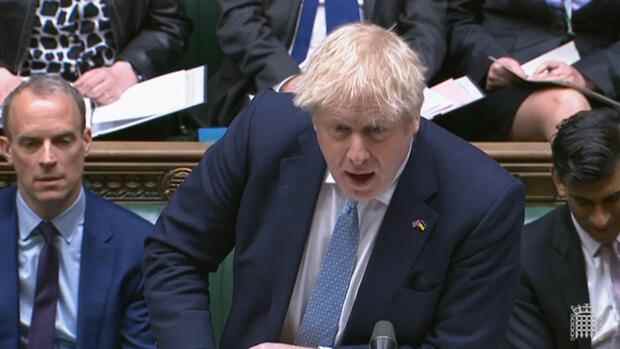The fact that this bleak outlook has not challenged the notoriously optimistic Johnson is mainly because his personal prospects were even bleaker two months ago. After it was revealed that Johnson had attended some banned parties during the lockdown, his retirement seemed a matter of days away. Numerous conservative parliamentarians had already called for the prime minister to be replaced.
Johnson probably owes his political survival to Vladimir Putin of all people. Russia’s invasion of Ukraine not only drew attention away from the “Partygate,” but also gave Johnson the opportunity to present himself as a determined statesman to his countrymen through tough sanctions against Russia and rapid arms shipments to Ukraine.
Top jobs of the day
Find the best jobs now and
be notified by email.
Although London police have now started issuing fines for the illegal parties, Johnson is said to have received no mail as of yet. In January, almost two-thirds of Britons still wanted Johnson to resign, but according to a survey by Opinium pollsters in mid-March, it was only around half.
“The prime minister can feel safe at the moment,” according to London government circles. Whether he can hold out until the next election also depends on whether he can get the cost of living crisis under control. The war in Ukraine saved Johnson for the time being, but its economic effects will haunt the 57-year-old for the remainder of his tenure, which is likely to last until 2024.
British Chancellor of the Exchequer Rishi Sunak’s austerity strategy has failed.
(Photo: AP)
Johnson also benefits from the fact that the British Conservatives have not yet been able to come up with a convincing successor. Long considered the party’s darling, Chancellor of the Exchequer Rishi Sunak has capsized in the political Bermuda Triangle of rising inflation, expensive government aid and his carefully cultivated image as a guarantee of sound finances and low taxes.
Many Brits not only resent Sunak’s increase in social security contributions from April 5th. The only 41-year-old Finance Minister is also blamed for the cold tax progression caused by rising inflation rates, which has been exacerbated by the freezing of tax allowances. Paul Johnson, head of the Institute for Fiscal Studies, calls Sunak a “fiscal illusionist”.
New energy strategy is expensive
The Prime Minister now wants to increase the pressure on his Chancellor of the Exchequer by announcing a new energy strategy for days, which is likely to put a further strain on the budget.
Even Johnson’s goals require a considerable balancing act: On the one hand, he wants to cushion the high energy costs with state subsidies for consumers and industry. In addition, the government wants to make itself less dependent on foreign energy supplies and at the same time stick to its climate goal of becoming emission-free by 2050. Although Great Britain is much less dependent on Russian energy than Germany, it is still feeling the global price pressure.
Johnson wants to achieve his goals, among other things, through a massive expansion of nuclear energy, which should contribute a quarter to electricity generation by 2050. In a radio interview, the prime minister said that Great Britain had to build on nuclear power. So far, however, Sunak has been reluctant to release the money for state participation in the Hinkley and Sizewell nuclear reactors, especially since Johnson wants to have up to eight more nuclear power plants built.
There is also a dispute about the planned expansion of large wind farms in the British Isles. Johnson would like to streamline the approval process for the wind turbines, but many of his conservative party friends fear for the English picture-book landscape and the rural population’s right to have a say.
Additional trouble is now threatening from the EU. Brussels has sued Britain at the World Trade Organization (WTO) for overly generous subsidies for wind turbines located off the British coast. “We are disappointed that the European Commission is taking this action at a time when we are focused on improving our energy security and domestic renewable energy supply,” said a government spokesman in London.
More: The end of austerity: How the UK’s Treasury Secretary is responding to inflation
